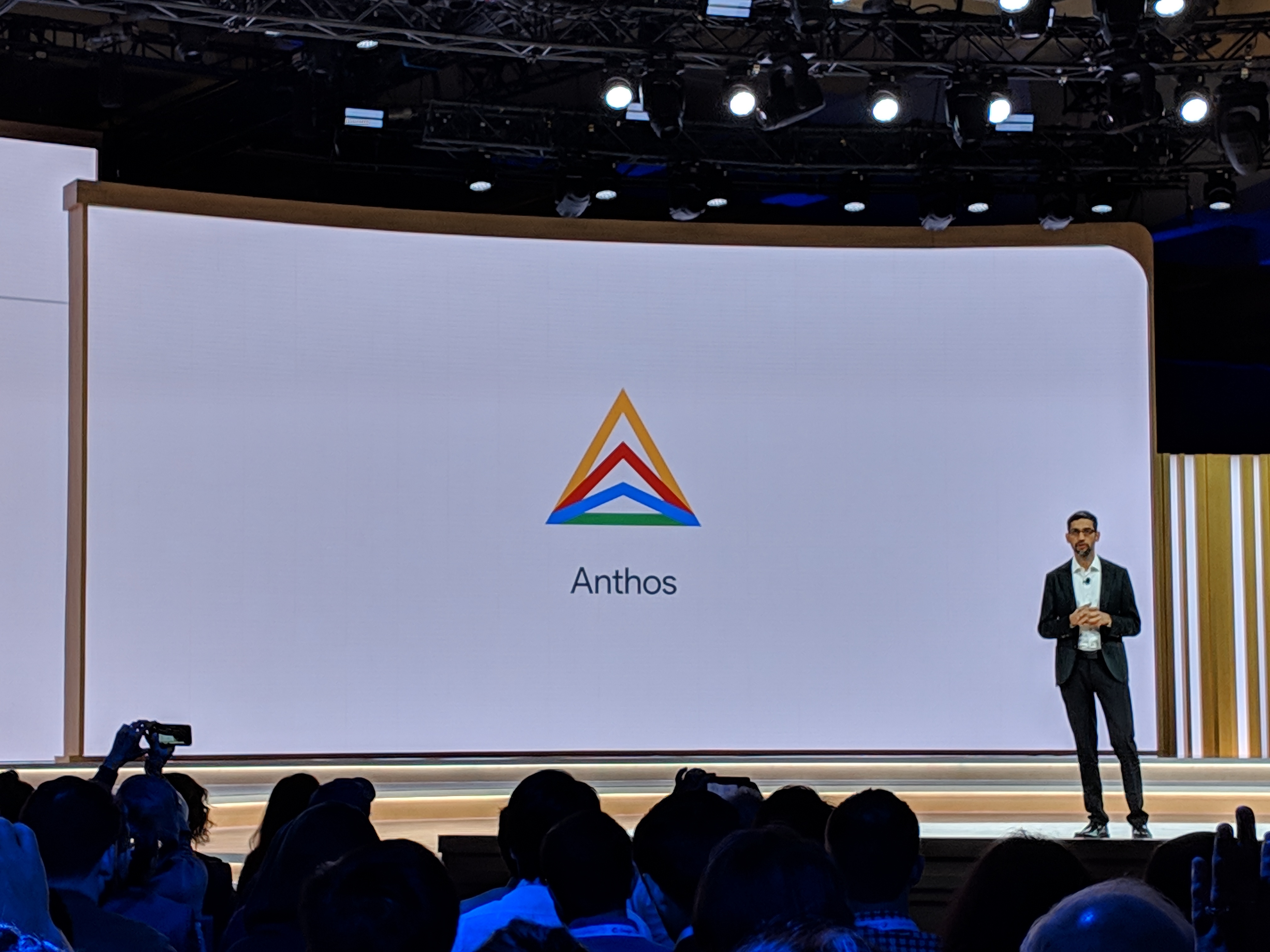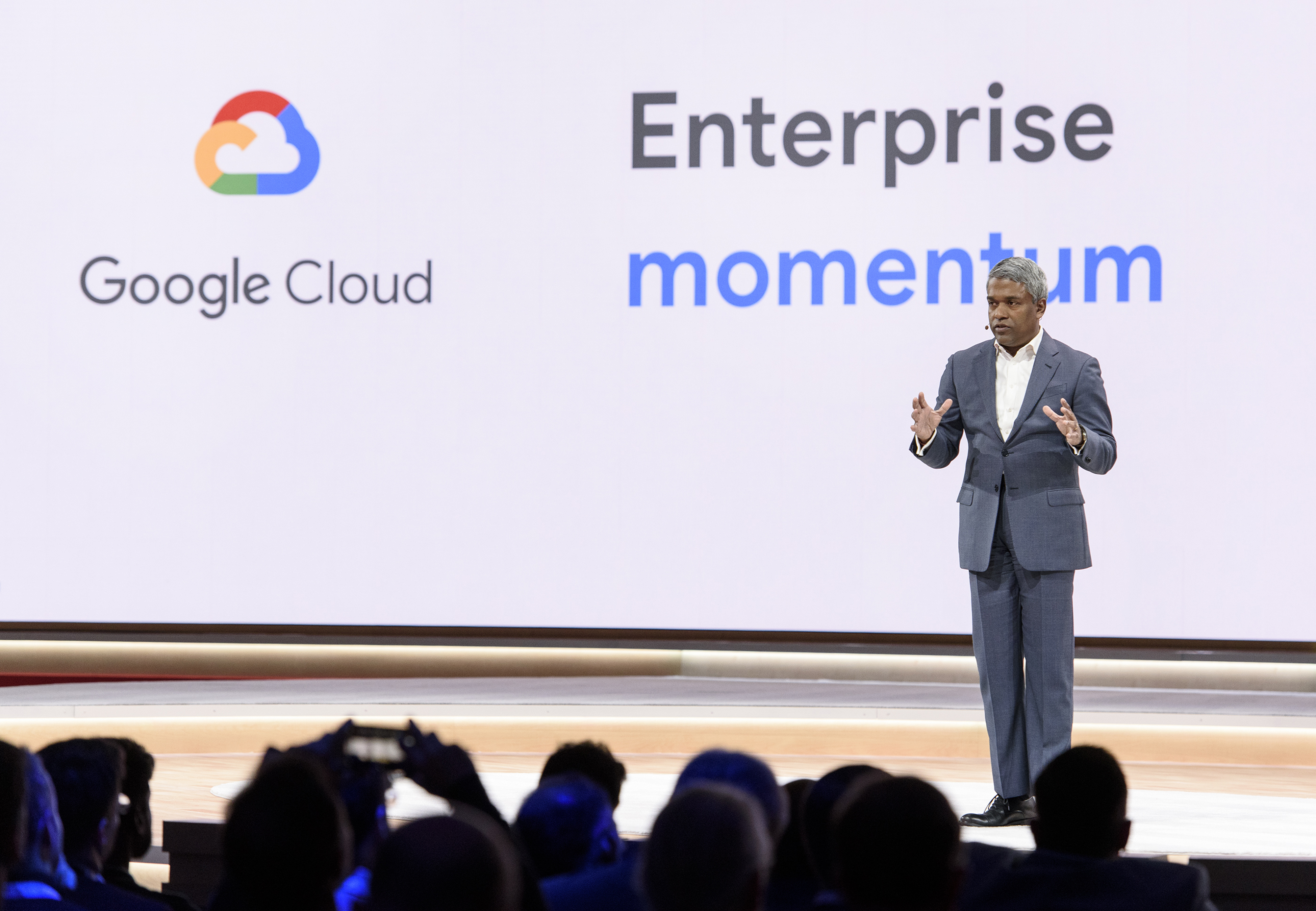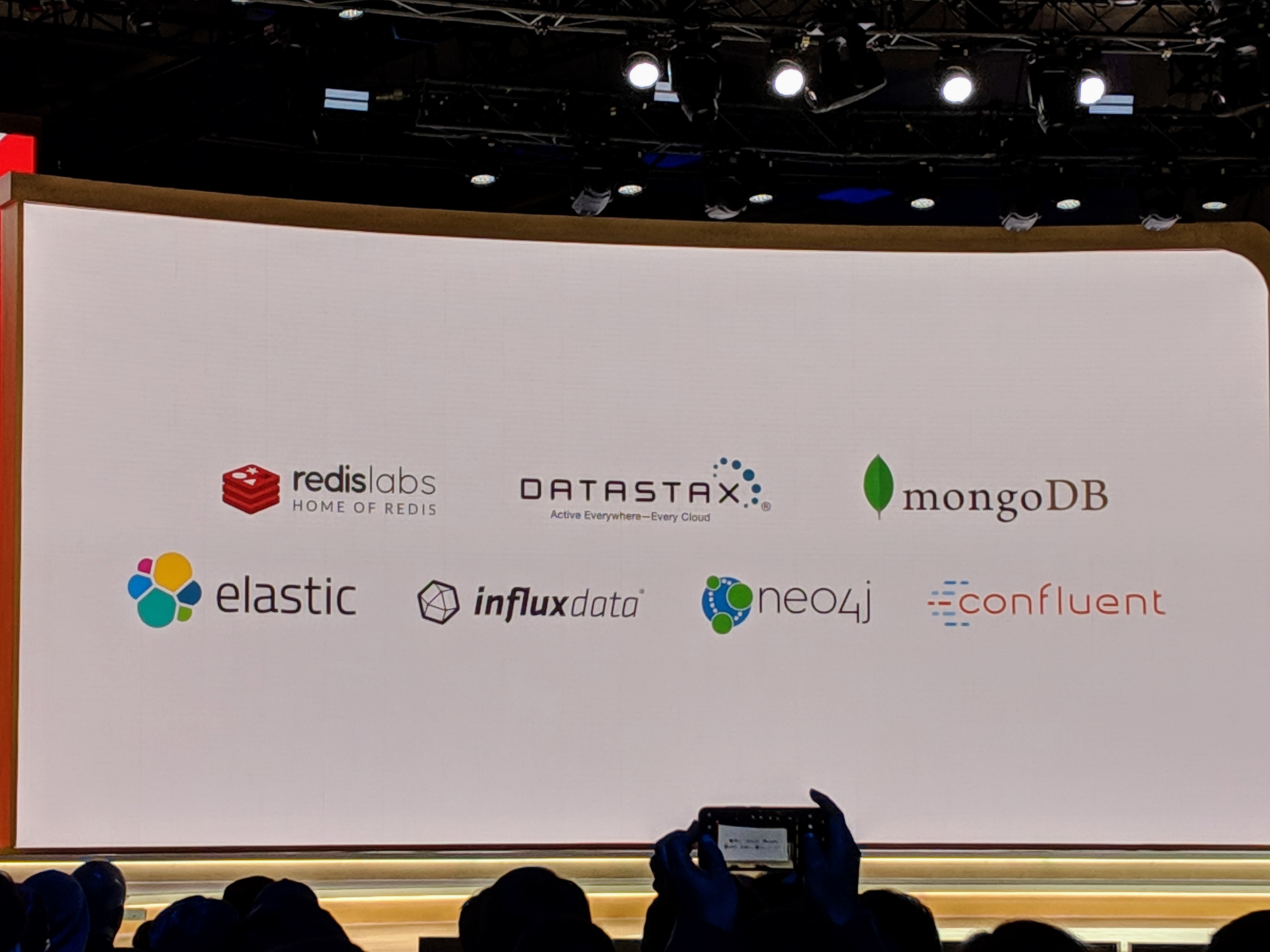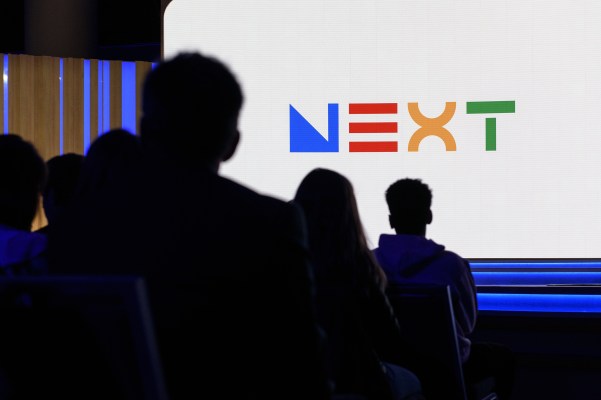Extra Crunch offers members the opportunity to tune into conference calls led and moderated by the TechCrunch writers you read every day. This week, TechCrunch’s Frederic Lardinois and Ron Miller offered up their analysis on the major announcements that came out of Google’s Cloud Next conference this past week, as well as their opinions on the outlook for the company going forward.
Google Cloud announced a series of products, packages and services that it believes will improve the company’s competitive position and differentiate itself from AWS and other peers. Frederic and Ron discuss all of Google’s most promising announcements, including its product for managing hybrid clouds, its new end-to-end AI platform, as well as the company’s heightened effort to improve customer service, communication, and ease-of-use.
“They have all of these AI and machine learning technologies, they have serverless technologies, they have containerization technologies — they have this whole range of technologies.
But it’s very difficult for the average company to take these technologies and know what to do with them, or to have the staff and the expertise to be able to make good use of them. So, the more they do things like this where they package them into products and make them much more accessible to the enterprise at large, the more successful that’s likely going to be because people can see how they can use these.
…Google does have thousands of engineers, and they have very smart people, but not every company does, and that’s the whole idea of the cloud. The cloud is supposed to take this stuff, put it together in such a way that you don’t have to be Google, or you don’t have to be Facebook, you don’t have to be Amazon, and you can take the same technology and put it to use in your company”

Image via Bryce Durbin / TechCrunch
Frederic and Ron dive deeper into how the new offerings may impact Google’s market share in the cloud ecosystem and which verticals represent the best opportunity for Google to win. The two also dig into the future of open source in cloud and how they see customer use cases for cloud infrastructure evolving.
For access to the full transcription and the call audio, and for the opportunity to participate in future conference calls, become a member of Extra Crunch. Learn more and try it for free.
Danny Crichton: Good morning, everyone. This is Extra Crunch Executive Editor, Danny Crichton. Joining us today are Ron Miller and Frederic Lardinois to talk about Google Cloud Next, which they’ve been experiencing and enjoying the last couple of days in San Francisco, as well as to talk about the wider cloud infrastructure ecosystem. Let me introduce our two TechCrunch writers today.
Out of Boston, Massachusetts, we have Ron Miller, who has been a long-time enterprise writer for TechCrunch and for a variety of publications. We also have TechCrunch editor, Frederic Lardinois, who’s also been focused on the enterprise space for many, many, many years, as well as Google in particular.
The two of them have been in San Francisco this last week at Google’s big cloud conference, Google Cloud Next, where there’s been a ton of announcements, including the remnants of Google Plus, which I worked on six years ago, which has now been sort of rebranded and turned around.
So, we’ll talk about all the announcements, the big highlights, and more with Ron Miller and Frederic Lardinois right now. What were some of the big highlights this week from Google Cloud Next?
Frederic Lardinois: If you look back just a few years, Cloud Next was this minor, minor conference that was happening somewhere on a pier in San Francisco with maybe 1,000 or 2,000 people. I remember one of the first ones, Eric Schmidt showed up and just started rambling for half an hour about the cloud.
This time around, there was so much news. There were 30-35,000 people at the event, and the amount of news was just staggering. I think we wrote 27 stories on TechCrunch just in the last two days alone, which tells you something. Ron, what do you think is the biggest news item?
Ron Miller: Like you said, there was this just onslaught of news, and we were just writing like mad people for two or three days, but I think when you look at that as a whole, you have to think that Anthos would be the biggest piece, and I know you wrote on that.
I sat in on the press conference when they discussed it prior to the event, and it’s just a huge differentiator for them in that it allows companies to manage workloads in a single interface, and they can be anywhere. They can be on-prem. They can be in the Google Cloud, but it’s really important here as they can be in competitor clouds like AWS or Azure, and that’s a huge differentiator for them moving forward, and something that gives them something to hang their hat on when they go out and sell Google Cloud to customers.
Frederic: Absolutely, and it’s something Google first ran as the Google Cloud Services Platform. About a year ago almost, they announced that, and at the time it was only Google Cloud, and on-premises data centers, and everybody expected we’ll see the same but didn’t expect a new name, which is a bit of a different name. The fact that they added AWS and Azure to this is just crazy.
Ron: Right. Yeah. I mean, it was a big shocker because it’s obviously incorporating their competitors into their interface, but it’s also really smart, if you think about it, because everybody is going multi-cloud. Nobody is going to just buy Google Cloud or just buy AWS, and to be able to say that “we don’t care where you go, we would like you to use our services, obviously, but we can help you no matter which cloud member you’re using”, is going to be something that they can tell as a story to their potential customers.
The sales team that [CEO Thomas] Kurian wants to build up can go out into the world and say, “Look. It doesn’t matter if you’re using AWS. It doesn’t matter whether you’re using Azure. It doesn’t matter whether you’re on Google Cloud. You can use our service to manage that.”
Frederic: That’s really what it comes down to because Google hopes that over time, more of those workloads will come to Google because Google argues that its platform obviously is technically so much better than anybody else’s, and the one area where they really want to differentiate themselves from the rest.
And they already have with AI. So, you might see companies that say, “We’ll run some of our AI workloads on Google. Maybe we’ll run some computes somewhere else,” and they can do that now while still being in the Google ecosystem.
For what Google is charging, I think it’s $10,000 a month for managing 100 virtual CPUs, so that’s decent money. It’s not where the real money is. The real money is getting those workloads onto the Google platform, and that’s really what they’re hoping for over time, that people will migrate more of these workloads on there while still giving them the choice, because these enterprises, they want choice at the end of the day. What they want is to be able to run their workloads wherever they want to, and managing those today in a multi-cloud or a hybrid cloud is just incredibly complicated.

Ron: They also talked a lot about how this was allowing companies to move away from the so-called lift and shift strategy, which means you’ll have to take a huge block of workloads, move them to the cloud, and kind of package them in a way that makes it work on that cloud.
And from what they were saying, if you manage everything in this console, you can push things from one to another without that heavy lifting, literally and figuratively, that you were doing before, because this console allows you that management flexibility. And if it truly, truly, works that way, it’s going to be, in some ways, a game changer and something that really puts them out there.
Frederic: Yeah, and they also announced was Anthos Migrate, which didn’t get a lot of play at the conference, didn’t get a lot of play in the media, but it’s a service that will just automatically migrate existing virtual machines from an on-premises cloud or other clouds, turn those into containers, and let you run them on Google’s Kubernetes engine, Google’s container engine.
And then you can take those machines and manage them again through Anthos. So, it’s an on cloud now that’s supposed to be as easy as just a few clicks, and that’s a major for these enterprises that are still running 70%, 80% of their workloads on-premises today.
Ron: So, you wrote about their AI pieces. Do you want to talk a little bit about that and how that fits?
Frederic: Yeah that’s a good segue because that’s really where Google’s strategy is going. Google wants to differentiate itself from the rest. AI is one of those areas. The other is Kubernetes and containers, which obviously come out of the Google ecosystem. The Kubernetes, those containers have been around for years, but Kubernetes is a manager that comes from Google, and so the AI platform, there was a million AI announcements at Cloud
Next. The biggest one, I think, is the new AI platform, and the idea there is to simply to give data scientists one end-to-end platform to get their data into a system, say BigQuery, for example, on the Google platform, clean it up, build models, train models, do tests, and then put those models into production on any cloud they want to.
That’s something that others have tried, but for Google it’s the first time they’re putting together all of these little pieces they’ve had in the AI ecosystem, into this one platform. Some of these services existed before. Some of them are new, but for the most part, this is an easier way for these data scientists and developers to make their data useful to take it into production, which usually is just a million steps and a million different interfaces, and this is one nice little piece.
The other part that they announced was updates to AutoML, AutoML Vision, AutoML Edge. And AutoML is the exact opposite of the AI platform. AutoML is for any user who just wants to build a model no matter how much expertise they have. So, we got some updates there that were relatively minor.
The most interesting one is the one that can read documents, scan documents, and turn them into useful information. Plenty of businesses have a million of these documents and unstructured data, and the idea here is to turn that into structured data. Am I missing something, Ron?
Ron: No, I think you got it all. One thing I wanted to tie that into was the piece that I did on retail, and one thing that they’re doing with AI (and with just about all of their markets) is to try and create a set of services that are defined specifically for a given vertical. So, the one that I wrote about was retail, and of course, that included AI pieces to have this product called Google Contact Center AI.
And in fact, they made an announcement this week in conjunction with Salesforce, where the two companies were working together. They were providing, Google Contact Center AI and some other AI pieces and combining that with Salesforce Service Cloud, and trying to bring a way to surface content more quickly for customer service agents, because people just sit on the phone, and they don’t get the answers that they want, and this is supposed to help them do that.

But they also had another piece that they’re putting into this vertical package, that’s like a service to keep you up during peak times. So you think the quintessential Black Friday scenario where you have people bombarding your servers to get the specials that you’ve put out there onto the internet, and the whole classic scenario of the pre-cloud, where you could never buy enough servers to keep going on Black Friday and then put them in a room for the other 11 months. That just wouldn’t work. But the cloud allows you to do that. It allows you to scale up to that humongous amount of computer power you need for that one day or a couple days in December, and then dial back down and only pay for what you need.
One of the things that has happened is even during these peak demands, even with a cloud, it’s not always perfect. We saw last year with Amazon on their Prime Day where they had trouble keeping up their servers because demand was so great. So, they’re coming up with this service. They’re saying, “We can help you stay up even when the demand is just so incredible that it would bring down just about anybody else,” and they’re making customer service, kind of white glove service, they call it, available so that should you run into problems, you have a person that you can call and say, “Help. Our servers are overloaded. What can we do? Can you give us more?”
So, that’s all the kinds of things that they’re trying to pull together. Other things that are more AI-related are like, if you like this, you might also like that, in a shopping scenario for consumers. Where they could point their camera at a product and say, “You know what? I like this. What other things are like this,” and then by seeing the picture, it can display other products that look like that or are related to that, that the company’s trying to sell, so a whole bunch of different things. G Suite for communicating amongst clerks and just different things so that you have this package of services, not just this kind of generic blob of here’s Google Cloud, you can figure out what to do with it.
They’re getting that people need to have stuff put together for them, and this will move toward that, and I think if they can do that successfully with other verticals, then that’s just yet another way for them to try and move the market share needle, and again, I think that’s a smart strategy.
Danny: So, Ron, and we’ll open up the conversation to questions in just one minute, but I’m curious. So, the big news, to my world, was not even in Google Cloud Next. It was actually the JEDI contract from the Pentagon, the $10 billion cloud contract, which Google actually dropped out of a year ago, and I think the final leads now are Microsoft and AWS, much, as you said, to Oracle’s chagrin.
So, I’m curious. Given this new strategy for AI, and since Google wants to be the integrator in the multi-cloud world, how does that contract play into that strategy?
Ron: Well, I don’t think that contract’s relevant to the strategy, but Google is a big player in AI. I think all of the companies are facing this, but particularly Google, where they have a workforce that has definite ideas about how they want to use that AI, and Google’s workforce decided that they didn’t want their AI being used by the military.
This is in contrast to Bezos, which when he was getting interviewed at one of the big conferences said, in so many words, “We would be happy to take the Pentagon’s money, and by the way, you’re terrible for not wanting to help the government.”
So, there’s this battle going on at that level about how you should be using AI and ethical use of AI, and I think it’s definitely a discussion that needs to be had, but Google needs to find a way to position itself so that it can get government contracts, because I think even though Bezos was being the consonant salesman when he said it, I think that we do have to find ways for the big tech companies to work in conjunction with government and do it in an ethical way because AI is going to become part of everything, and Google obviously has high quality AI tools, and they have to be part of that conversation.
Danny: Well, absolutely. This is the first time we’ve seen Kurian leading the cloud world for Google. I’m curious, how was his performance? How did you think it went?
Frederic: It was a marked contrast from Diane Greene, who is amazing in person. Really great to talk to, but her onstage performance was always a bit … Erratic is maybe a nice way of putting it. It was a bit messy sometimes, but she definitely had personality. I think Kurian still has to work more on that personality front. 22 years at Oracle, he’s not the most natural speaker.
But in his defense, he did speak almost for the whole two keynotes and he did it without prompter notes while everybody else was reading from prompters. His prompter notes just said, “TK speaks to slides.” He did well there, I think.
I also had time to sit down with him for half an hour just to chat with him and ask him about what his plans are for Google Cloud in the future and how he wants to separate his era there from that of Diane Greene. I couldn’t really get too much out of him in that respect, but we know he wants to hire more people, just click deeper, click in on what the customers need.
Everybody’s going to say that but more help, more people to help enterprises get onboard, to get startups at the same time, but the focus clearly is on enterprises under them. But overall, it was a very smooth conference. I think what I’ve heard from the audience was very positive, and his performance was perceived as quite well.
Ron: I agree, that when I spoke to Diane one-on-one, she was so personable, and just really likable, and when she went up onstage, that didn’t always translate there. Not that she wasn’t likable, but that she just wasn’t as diffusive as she is in person, and Kurian didn’t do much to change that, as Frederic said. It was fairly stiff, but he got the points across, and he got the information passed along to his customers, and that’s really what his job was to do, not to win a personality contest.

Image via Getty Images / Michael Short / Bloomberg
Danny: So, I think one of the questions I have is obviously AWS wants to be the integrated cloud. Everything is on AWS, all the workflows, all the data. Everything is on one platform. Google now wants to play this role of intermediary between a couple different public, and maybe even your on-prem infrastructure. Even though they’re best in class, aren’t there a bunch of startups that are trying to compete in each of these little bucket categories that Google is, and do you think that this strategy ultimately is going to be successful for Google?
Frederic: Well, Google, obviously it will be. Yes. I mean, Kurian, when I talked to him, he contrasted his approach with that of AWS, and he was very much of the view that open ecosystems always win in the end or in the long run. Maybe not in the short term, but in the long run, they win. So that was very much his take there.
And then, of course, there are startups competing with Google in a lot of the areas. IBM does multi-cloud. There’s plenty of others who do that, but they are not Google, and Google can buy them if they want to, and it’s perfectly fine for them to compete. I think there are little pieces where there’s room for startups. There are those pieces where startups will just get bought by Google.
There’s a whole open source ecosystem around the products that Google has open sourced, and others. In the Kubernetes and cloud-native world, there’s Envoy and all of the services that get built around that, but that enables a lot of what we’re talking about here. So, I think there’s plenty of room here for startups to still innovate, and I’m sure, Ron, you probably agree.
Ron: Yeah, definitely. I mean, I think of some of the niche cloud players, and Danny, you and I spoke to Packet last year, and they were certainly one of them. Paperspace is another company that we spoke to, the guys out of Brooklyn were doing the machine learning and GPU stuff there. Even somebody like DigitalOcean is certainly trying to provide services to people in the spaces between the big cloud players, and I think that that’s a viable and successful approach. But I don’t think that has much to do with what Google is trying to do here.
I think what Google is trying to do here is more than fill in the spaces. They want to be the company that sits in the middle, and really gives you that platform to manage everything in one place. By the way, if you used Google Cloud service in addition to that, they would be very happy about that. But maybe that’s what they’re doing. They’re trying to use Anthos as a gateway drug to allow them to get customers to see, “Look. Look what we can do.”
One thing we haven’t mentioned is the enigma that Google has been, because obviously, Google runs Google Search, they run YouTube, they run Maps, they run Google Docs, they run these massive, massive services every single day, and nobody can deny that they have this incredible technology. Yet they haven’t been able to somehow translate that ability to run their own services into commercial services where they act as an intermediary for other companies, and that’s what they’ve been trying to do.
I think these kinds of products and services that they’ve introduced this week really give them at least the ability to get people in the door and say, “Look at us, and now that you’re here, maybe you want to look at some other stuff.”
Danny: Another question I have is, Google has actually been one of the major advocates for open source in the cloud infrastructure community. Certainly, Kubernetes has been a major force in that industry, among a bunch of other technologies. What’s Google’s open source strategy right now, and how is that competing or differentiating from some of the other cloud providers in the industry?
Frederic: Yeah, that’s the other announcement we didn’t really talk about yet, and that’s the integrations into the Google Cloud with a bunch of open source companies and partners and products like the Confluence Data stack, Elastic, InfluxData, MongoDB, and Redis. Those are some of the leading open source companies right now, some of whom are even public.
But AWS already gets accused of taking open source and just using it for its own products without contributing back, and that’s changing a little bit. So, if somebody from AWS is on the line, don’t email me. I’m aware of that. But that has definitely earned the reputation.
Products like Elastic, for example, AWS will take it, build its own product, focus it essentially, make changes to it, but not contribute back. And that’s just escalated over the last year when a number of companies, like Mongo, Elastic, and Redis, have changed their licensing just so that AWS, and others too, cannot just take their open source and run with it. So, they need to get a commercial license from these companies to do that, and that’s expensive, and at least they’ll get money for it.
Then Google, on the other hand, comes along and says, “You know what? We’re not just taking your open source. We’ll work with you. We’ll send you customers. We’ll integrate you really deep into our own cloud, even though we have competing products in the data space world,” products that compete with MongoDB, for example.

So, Google’s approach is completely different from that of AWS, at least for the time being, and Microsoft has done similar things with integrating products like Databricks into Azure. We shouldn’t forget that either. But Google is really just playing that card here, wherein the open source world there’s a lot of animosity towards AWS, while Google is now getting to bask in the glory of integrating all these products and getting the good PR for it.
So, it’s a very, very different approach, and we shouldn’t forget the containers and Kubernetes, and a million other projects have come out of Google over the years that make all of what we’re talking about here today. Almost every product we’re talking about runs on Kubernetes in some form, so Google’s approach has been very, very different from AWS.
Ron: Yeah, absolutely. I think that AWS, in some ways, has alienated the open source world, and Google saw that and said, “You know what? We can capitalize on that particular piece,” and they took advantage of it this week, and really showed off that they are going to be, or try and portray themselves as the open source-friendly platform.
Now, the proof will be whether they actually follow through on that and do it, but right now they are trying to contrast themselves from AWS, and that’s what they have to do because… We haven’t talked very much about the market share, but Google is way behind. They’re single digits, and they have been pretty much stuck in single digits for as long as I’ve been following the cloud market.
AWS is way ahead. Nobody’s even close to them. If you take the five companies below AWS and you add up their market shares, it doesn’t add up to AWS’s market share, which is around 33%. The next big player, which isn’t even close, is Microsoft, and they’ve come on strong over the last couple of years and added a bunch of points to their market share. So, that’s huge, and Google has been stuck in three, four, five, maybe as high as eight, depending on who you look at, and they really needed to make a big move here.
They really needed to make a big splash, and this business with Anthos, this business with open source, this business with verticalizing… I think it really helped push them out into the market. Again, they have to execute once they’re out there, but they have the pieces, and let’s face it. They’ve always had the pieces. They’ve always had the technology. But they needed products, and I think they’ve really productized things in a much better way this time than they have in the past.
Caller Question: Hi there, can I ask a question?
Ron: Sure. What’s your question?
Caller Question: Hi, Ron. Hi, Frederic. So, Google also launched Document Understanding AI in data. What do you think about Google going into that market, and what do you think of the data?
Frederic: I think it’s a smart move. Right? It just combines a lot of the existing Google AI products into a single one that others can then use. I think … Was it Box? Somebody is already integrating some of this into its own startup, right?
Ron: Yeah, that’s the announcement from yesterday.
Frederic: Right. So, I think it’s smart. It’s another of these vertical solutions that I think we’ll see. This is one that’s very specific, obviously, but we’ll see Google do more and more of this, where Google packages a lot of these disparate products it has for OCR and for then understanding the text and extracting entities. All of that in a single product that is then offered to companies like Box where it falls under these democratized AI labels, but that’s not really what it is. Right?
You still need experts for this, but where Google can say, “Hey, we’ve got this packaged solution for you,” and I think we’ll see more of that. Right now, it’s under Document Understanding. You might see Google do more of that around speech understanding, and maybe do something specific for the media industry, for example, in the long run. But maybe, Ron, you have a take there.
Ron: I think you’re right that it’s absolutely essential that they take these pieces that they have, and as we’ve said, they have great technology. They have all of these AI and machine learning technologies, they have serverless technologies, they have containerization technologies — they have this whole range of technologies.
But it’s very difficult for the average company to take these technologies and know what to do with them, or to have the staff and the expertise to be able to make good use of them. So, the more they do things like this where they package them into products and make them much more accessible to the enterprise at large, the more successful that’s likely going to be because people can see how they can use these.
If you have this kind of raw technology that requires Google-like engineers to use, well, Google does have thousands of engineers, and they have very smart people, but not every company does, and that’s the whole idea of the cloud. The cloud is supposed to take this stuff, put it together in such a way that you don’t have to be Google, or you don’t have to be Facebook, you don’t have to be Amazon, and you can take the same technology and put it to use in your company. So, they’re going to have to do more of that, and this is certainly a step in the right direction.

Image via Getty Images / cifotart
Caller Question: Great, thank you.
Ron: You’re welcome. Anyone else?
Caller Question: Hi, all. I was just a bit curious on what the outlook from here is. Why has Google been stuck to date, and what should we be expecting from Google over the next one to two years or so?
Frederic: Okay. That’s a huge question. Why has Google been stuck? That’s the question everybody’s asking, I think. Right?
Ron: Yeah. Absolutely.
Frederic: Ron, I think you have an opinion on why Google has been stuck.
Ron: Well, they’ve been stuck because, as Kurian told you… The story is that they’re not friendly enough to the enterprise, that people, when they come to them, and this goes back to the last question, they had great technology, but they weren’t enterprise-friendly enough. They have to make their products more accessible, and they have to have more people, and that’s one of the things that Kurian said.
I made a generalized tweet about the first day, and I said something about how they’re clearly trying to differentiate themselves here, and somebody responded, “Well, it would be good if somebody would be around to answer the phone when I call.”
I thought that was telling, especially in the context of Kurian’s comments to you, Frederic, because maybe they really do have a people problem. Maybe they really don’t have enough people, and the idea has always been that Google never had a lack of engineers, but those engineers, you can’t just have engineering power. You have to have marketing and sales power, and you have to have customer service power, and you have to be able to take all of those pieces and put them together in such a way that it makes it easier for people to run their businesses.
This is the whole idea. It’s not just technology for technology’s sake. It’s technology so that you can take these products and services, and if you run them, you get the same benefit that you would get if you were Google or Facebook or Amazon, except you’re not, and you don’t have that engineering team, and you don’t have that kind of support system in play.
So, that’s what Google’s challenge is here. Can they take what they have, those big pieces, those technology building blocks, put them together in such a way that they can sell them to people and say, “Yeah, look. We’ve created these products for you, and now all you have to do is take them and use them, and you don’t require a whole engineering team to do it.”
Frederic: I think they’re painfully aware of that problem. Half of my time with Kurian was talking about that, and he argues that Google was always focused on the enterprise, and that it’s not true that Google never focused on the enterprise.
Now, under Diane Green, the statements were kind of similar. We were focused on hiring more people and helping enterprises. Right? So, the question now is can they pull it off this time under Kurian, who’s got a lot of experience at Oracle in doing just that. But the question is what will actually really change now? Will they hire the right people? Will the enterprises finally get somebody to talk to, and will they get the help they need, and will get the onboarding help they need?
Because that’s been one of the advantages for a company like Microsoft, which already had the sales force out there, which could sell Azure as just another part of its package, to companies that were already locked into said ecosystem.
Google didn’t have that. Google was late, surprisingly. It took them years to just build extra data centers. I remember when Google just had two data centers in the US, I think, for its cloud. It was ridiculous at the time, and then finally, under Diane Greene, that changed very quickly. Now Kurian has to follow through.
A lot of the announcements that we saw this week were put in place long before he joined Google, so now he has to put his stamp on there and really make Google Cloud accessible to these enterprises. I think with Anthos and a lot of these initiatives we saw this week, they’re in a good place.
Ron: Yeah, and I think that involves a cultural shift. That’s the harder part. I think the technology is probably the easy part for Google because they’re so technologically savvy. The challenge becomes, for somebody like Kurian and his team, to change the mindset, to bring in people who have a real customer orientation, who’ll say, “Look. This isn’t just about the technology. It’s about this other stuff.”
Companies need to feel like they’re heard, and they need to feel like they have a throat to choke, for a lack of a better term, and they need to feel like this isn’t just a geeky pile of tech. This is stuff that can help them.

Image via Getty Images / John Fedele
Frederic: Yeah, so on what to expect next, that’s definitely what we should expect next, this hiring, this focus on service, people service. And the other part I think that we talked about are these vertical solutions.
Packaging up some of the solutions they have, because that’s great for techies. “Oh, we’ve got TensorFlow. We can play around with that in open source, and there are models”, but that’s not going to help an enterprise company that’s struggling to modernize. And I hate the word digital transformation, but that’s really what it is for a lot of these companies, to figure out how do we develop now because everybody is a software company.
How do we use these modern development techniques? Those packages will help a lot, and I think that’s where Google can play to its strengths. Now, if they do it smartly by offering these vertical solutions that are probably better than most of their competitors can offer, or should be, at least, because they come out of Google. So they do have a chance there. I think in the next year or two, that’s going to be very much the focus of Google Cloud, besides all the AI innovations I expect to see going forward.
Danny: Fantastic. Any final thoughts from you two?
Ron: I think it was a productive week for Google. Obviously, as Frederic said, this isn’t stuff that happened since Kurian came onboard. I think they hired him in December, or the end of November anyway. So, all of this stuff was in the works. This is not anything that he’s put his stamp on.
Now the question becomes, as we move forward, as we look forward to the next Google Cloud Next, next year, what will Kurian bring to the company? His experience putting software out the door at Oracle, which he really has a reputation for having been good at, and for selling software, is that something that he can translate into his position at Google?
If he can do that, then we should start to see the market share numbers move up, and there’s a huge opportunity here. Diane Greene said to me in one interview “You can’t see my hand, but my hands are very close together, and there is where we are in the cloud market,” and she said, “But the market,” and she said she spread her hands wide, “is this big.” And that’s true, and it’s still true.
There’s still a very small percentage of workloads from the enterprise in the cloud. There’s tons of market opportunity left. Google is very late. There’s no doubt about that, but it’s not like there still isn’t a ton of opportunity for that. The pie is still growing. The question is can they grab a bigger piece of it, and that’s going to be Kurian’s challenge.
Frederic: Kurian would say, “I don’t care if we’re number one, or number two, or number three, or number 250 as long as we grow the company.” That’s what he’s going to say. I don’t know that we’ll see Google move up in market share all that quickly because a lot of these cycles are just very slow.
But I would expect that we’ll see the overall numbers to increase for Google. I think they’ll do better in the next few years. That’s my sense, at least. I came out of this conference feeling pretty positive about the direction they’re on.
So I think that’ll be interesting to see, because if the focus is not just on flashy tech, but finally on selling, that should work out quite well for them, I would think, but proof remains to be seen, and we’ll see if next year at Cloud there will be 60,000 people, and then they’ll move to Vegas and just take over all of the strip.
Danny: Great. Ron, Frederic, thank you so much for joining us, and to all of our readers on the phone call, thank you as well for joining us. If you have any feedback on this conference call or anything else about Extra Crunch, do let me know. I’m at danny@techcrunch.com. Have a great day.
